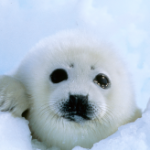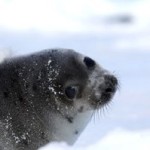END OF SEAL HUNTING EUROPE?
END OF SEAL HUNTING EUROPE?
Norway stops subsidising commercial seal hunt effectively ending commercial seal hunting in Europe
The Norwegian government has announced (October 2014) it will no longer waste money propping up an unnecessary commercial seal hunt citing the need to manage “economic priorities.”

“This is brilliant news and it will save tens of thousandsof seals a cruel death. This is also tremendous success for the EU ban on commercial seal products. By closing our markets to cruelty Europeans can be proud of ending cruelty elsewhere,” said Sonja Van Tichelen, International Fund for Animal Welfare (IFAW) EU Regional Director.
The decision to cut the 12 million kronor (£1.2 million) subsidy comes less than a year after the WTO upheld the right of the EU to ban commercial seal products on moral grounds.
“It seems clear that the conservative Norwegian government has realised that the bans on commercial seal products in 34 countries are not going away, rather, it is commercial sealing whose time has come,” continued Van Tichelen.
Norway, like Canada, has allocated subsidies to its sealing industry for years – providing support to an industry that is no longer necessary. With its long list of priorities to balance for its people, and only three boats taking place in the Norway seal hunt in 2014, it is no surprise – and rather prudent – that the Norwegian government has examined is economic priorities and chosen to focus on other activities.
IFAW thinks this makes sense and hopes that the Canadian government follows the lead of Norway. Canada has provided support to Canadian sealers for decades, but the kinds of support it has provided were clearly ineffective. It’s time to support sealers as they get out of the industry.
Key Facts:
Although the EU itself was a small market for seal products, the EU ban on the trade of products has global influence and it has resulted in declines of global demand for seal products.

There are 34 countries which now ban the trade in seal products, the 28 Member States of the EU, Russia, Kazakhstan, Belarus, Mexico, USA and Taiwan.
Over 98% of seals killed in commercial seal hunts are between 2 weeks and 3 months of age.
IFAW does not, and has never, campaigned against the Inuit hunt, or the personal hunt of seals for food in Newfoundland.
According to the International Union for the Conservation of Nature and Natural Resources (IUCN), climate change is already having a negative impact on harp, ringed, and hooded seals. These three species are ice-dependent seals, which means that changing ice conditions are expected to result in increased mortality and other threats.
The EU seal ban came into force on 20 August 2010 and applies to seal products of EU origin and to imported products.
For more information about IFAW visit www.ifaw.org
